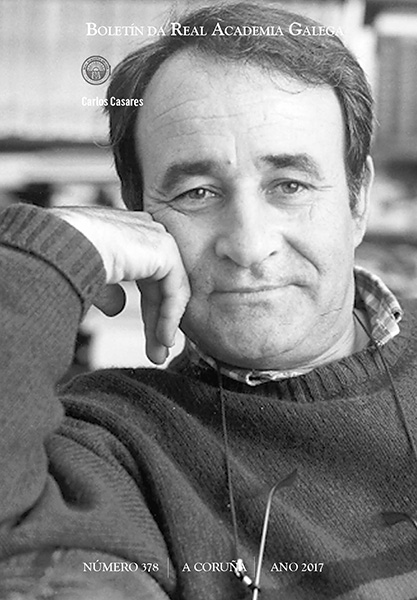'Os mortos daquel verán': todo era verdade
Descargas
Publicado
Cómo citar
Número
Sección
DOI:
https://doi.org/10.32766/brag.378.679Palabras clave:
Carlos Casares, guerra civil, Memoria Histórica, Os mortos daquel veránResumo
O autor, tamén escritor, explica a importancia que tivo na súa decisión de dedicarse á literatura a lectura de Os mortos daquel verán. Sobre todo ficou impresionado pola forma, a estrutura, a decisión casariana de contar esa historia dun xeito poliédrico a partir de dez testemuñas que dan a súa versión, contraditorias, incoherentes, subxectivas, sobre a causa de morte do boticario. Por iso mantén que é, de toda a obra de Carlos Casares, a de máis altura literaria. Por outra banda mantén que esa lectura, unha vez rematada, fermenta dentro da conciencia do lector para facer que abrolle a verdade que buscaba Casares para que se coñeza sen el o citar abertamente en ningún momento: a denuncia da barbarie fascista dende o inicio da guerra civil. Casares anticípase, así, ao boom posterior de novelas sobre a Memoria Histórica.
Descargas
Citas
Calvino, Italo (1990): Leccións americanas. Seis propostas para o vindeiro milenio. Pontevedra: Kalandraka Editora.
Caneiro, Xosé Carlos (2004): “Os mortos daquel verán”, en Xan Carballa e Damián Villalaín (eds.), Carlos Casares. Os amigos, as imaxes, as palabras. Vigo: A Nosa Terra, 149-150.
Chéjov, Antón (2005): Sin trama y sin final. Barcelona: Alba Editorial.
Loureiro, Ramón (2003): Carlos Casares. Vigo: A Nosa Terra.
Monteagudo, Henrique (2017): Carlos Casares. Un contador de historias. Vigo: Galaxia.











